Escaping the Holiday Crowd in China Posted by sasha on May 6, 2015 in Uncategorized
It’s no secret that traveling during major Chinese holidays can be rough – millions of people move around the country at once, with seemingly never-ending traffic jams, long lines everywhere you go, and the phenomenon that is best described with the Chinglish idiom “people mountain people sea” (人山人海 – rén shān rén hǎi). While things are especially terrible during the two Golden Week periods of Spring Festival and National Day, the short holiday at the beginning of May to mark Labor Day (劳动节 – láo dòng jié) is also a notoriously bad time to travel. My past failed travel experiences around May Day have been well documented here on the blog – there was that time we slept in a KTV when we got lost going to a music festival, and that time in Dalian where we got trapped in what was quite possibly the worst day tour ever.

A typical crowd on a Chinese holiday.
After those two disastrous experiences, you’d think I would have learned my lesson and stayed home this year. You would, of course, be wrong. I wanted to prove to myself, my students, my colleagues, and our readers that it’s possible to have an enjoyable May Day holiday in China. Having just returned yesterday morning, I’m happy to say that the third time was the charm. Here’s a little recap of my (finally) successful May Day trip.
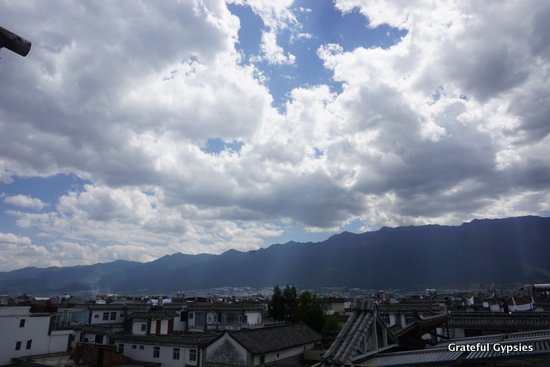
Finally, a successful May Day!
As we usually do on these short holidays, we decided it was best to stay local. Well aware of the terrible traffic that congests the highways during holidays, we also wanted to stick with the train. Since we currently call Kunming home, that left us with limited options – there are not nearly as many short train rides available from Kunming as there are from other bigger cities. In the end, we decided to return to Dali (大理 – dà lǐ) for the first time since 2011. Of course, plenty of people warned us of traveling to such a popular place for a major holiday:
“It’s going to be so crowded!”
“In Dali it will be ‘people mountain people sea’!”
“You guys should just stay in Kunming!”
Well aware of the throngs of domestic tourists that would descend upon the ancient town in Dali, we opted to stay in a village on Erhai Lake (洱海 – Ěr hǎi) just a few kilometers outside of town. With a little balcony and a great view of the lake, we were able to kick back, relax, and enjoy the scenery without the accompanying crowd of selfie-snapping Chinese tourists.
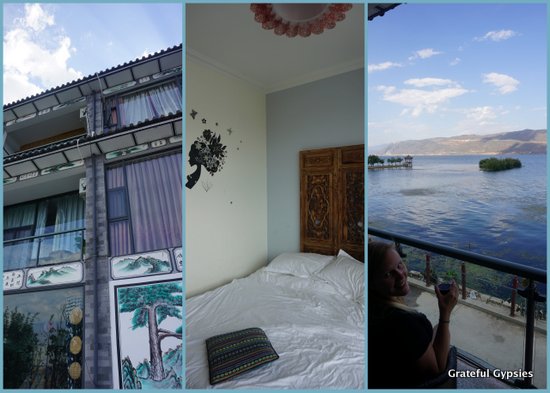
Home for a few days in Caicun.
The village, called Caicun (才村 – cái cūn), is currently undergoing a massive construction project that seems to be turning every single speck of land into hotels. While it seems that they have grand plans for this lakeside village, it’s still relatively quiet (minus the occasional sound of drilling) and off the radar of the dreaded packaged tour groups that plague most popular destinations on Chinese holidays.
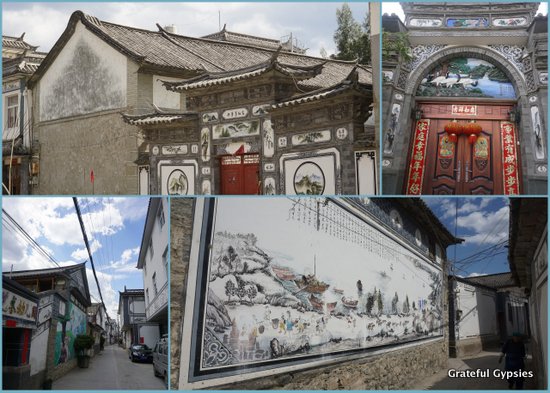
Quiet… for now at least.
During the day, quite a few tourists come down to the village to visit the lake. Just like ants marching, they ride down the road in novelty 4-person bikes, decked out in cowboy hats and brandishing their selfie-sticks for that perfect WeChat shot. To escape the crowds, we simply had to duck down one of the many alleyways in the village. In a matter of minutes, we went from being in a sort of tourist Disneyland to the real deal Bai ethnic minority (白族 – bái zú) village. I’m pretty sure we even stumbled upon a funeral ceremony.
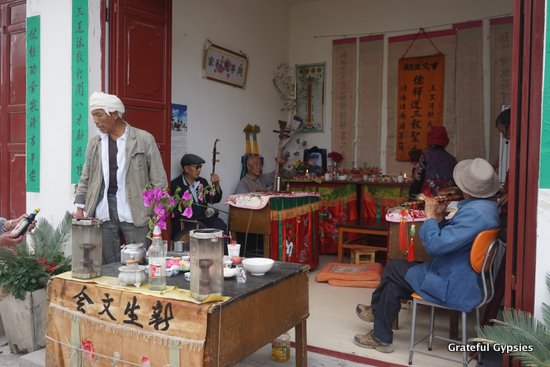
Pretty sure this was a funeral.
Although there aren’t as many options for dining out in the village, you can get better, more authentic food for cheaper than in the town. For lunch on our first day, we hit a local joint that had a classic Yunnan menu – simply point to what you want in the cooler and choose a fish from the boat.
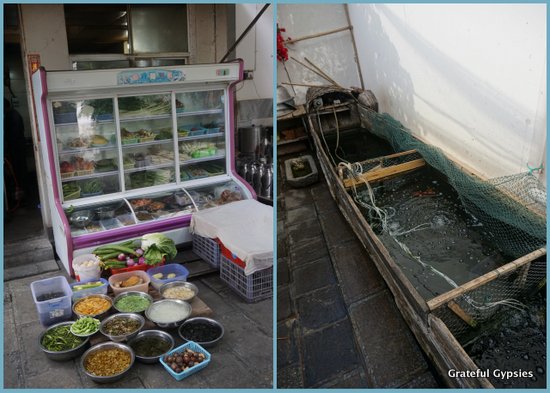
The menu at a village restaurant.
Being right on the lake, we of course had to try the local specialty of sour-spicy fish (酸辣鱼 – suān là yú), accompanied by some braised eggplant (红烧茄子 – hóng shāo qié zi) and wood-ear with fried pork (木耳炒肉 – mù’ěr chǎo ròu). If that sounds disgusting, don’t worry – the name comes from the resemblance of this black fungus to an ear. It’s absolutely delicious, and a fixture on menus all across Yunnan.
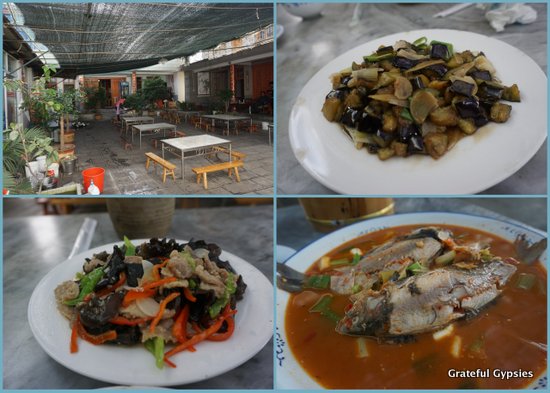
A delicious local lunch.
We enjoy going out for a beer at night, but we thought that our options would be limited to room temperature, watered down local brews in the village. Much to our delight, there’s actually a cool bar in Caicun called Mou Mou that even makes their own beer. It’s always nice to find a brew that you can’t see straight through in China, and this was yet another sign that craft beer is here to stay in the Middle Kingdom.
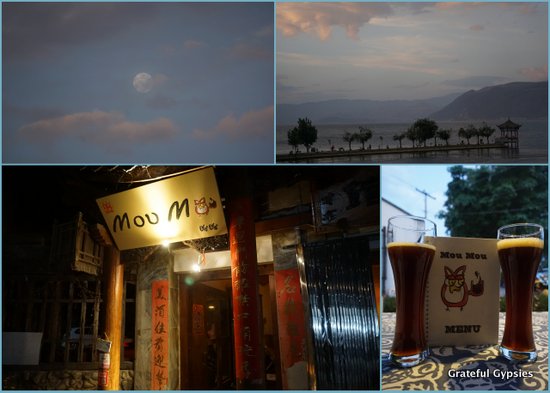
A nice relaxing evening in Caicun.
Bright and early in the morning, we headed to the rooftop of our hotel to catch the sunrise over the lake. I don’t usually enjoy being up at 6:30, but this was definitely worth getting out of bed for.
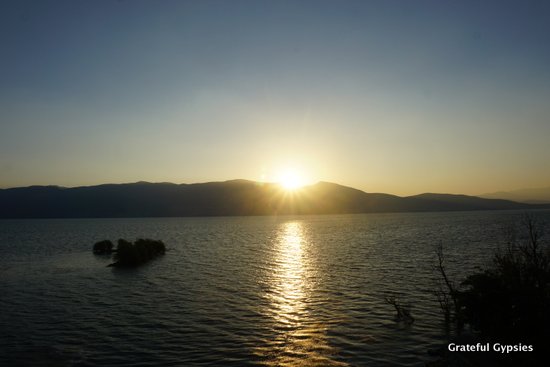
Sunrise over Erhai.
On our second day, we decided to head for the hills and go to Mt. Cang (苍山 – cāng shān). We caught a bus to the old town, which predictably got stuck in a congested hot mess of traffic. Realizing it would be faster to walk, we got out and cut through the streets of the old town. Along the way, we encountered countless couples on novelty bikes and country bumpkins who were far too excited to see foreigners.
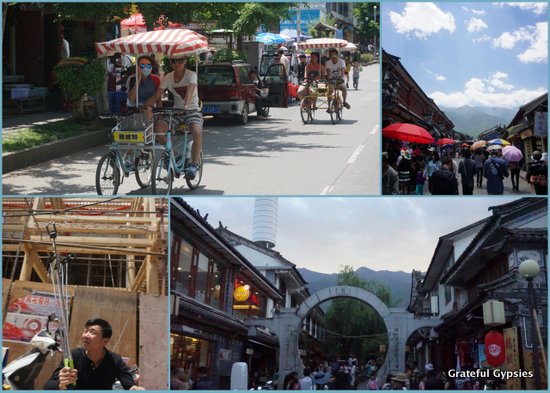
Super touristy old town.
It’s not that the mountain itself isn’t a popular tourist attraction – plenty of people visit it every day – but very few Chinese tourists are willing to hike. This explains the presence of cable cars and rope ways at just about every scenic area in the country that involves some sort of upward movement. If you’re willing to sweat it out and hike up the mountain, you’ll find yourself completely alone within minutes, surrounded by the sounds of the wind blowing and birds chirping.
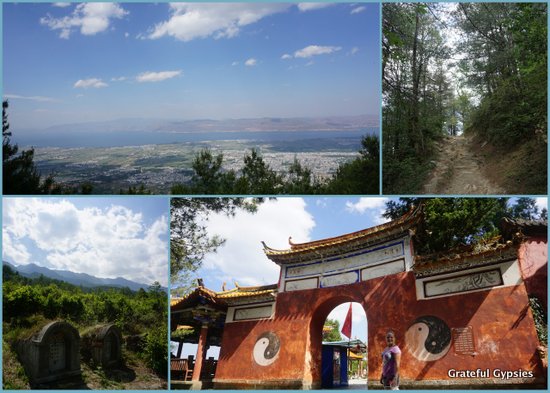
Hiking in Mt. Cang.
Towards the top of the mountain, you’ll find the Cloud Traveler’s Path – a long, flat, winding road that takes you through the mountains. If you want to escape the crowds here, do as we did and head up there around dinner time. If there’s one thing Chinese tourists are not going to be late for, it’s meal time. Strolling along the path around 5 PM, we saw all of five other people in the hour and a half we spent up there.
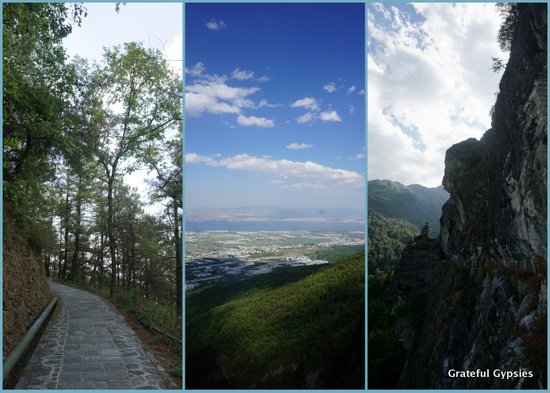
Escape the crowds by hiking.
With sore legs from our day of hiking, we decided to spend the last day exploring the lakefront. One thing that has changed since our last visit in 2011 is the availability of both electric and motorbikes for rent; previously you could only cycle around the lake. Our choice of wheels was pretty obvious:
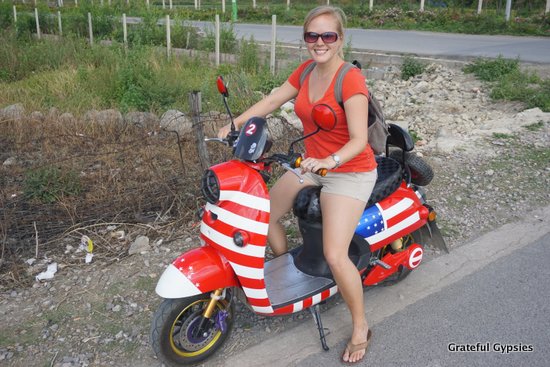
USA! USA!
It’s not that we didn’t see other tourists along the way – there were plenty of them – but it’s very easy to escape the crowds on the lake. There are tons of places with stools and hammocks set up, along with simple snacks and drinks for sale. The views of the lake are incredible, and you can even jump in and go for a swim if you like. Unlike many lakes in China, Erhai is protected and is clean enough to take a dip in. For further exploration, you can even put your bike on a ferry and head to some of the small villages on the other side. We were in search of some R&R, however, so that will have to be saved for our next visit.

Panorama of Erhai.
Have you ever traveled in China during a major holiday? We’d love to hear your experiences – both good and bad – so leave a comment!

Build vocabulary, practice pronunciation, and more with Transparent Language Online. Available anytime, anywhere, on any device.
About the Author: sasha
Sasha is an English teacher, writer, photographer, and videographer from the great state of Michigan. Upon graduating from Michigan State University, he moved to China and spent 5+ years living, working, studying, and traveling there. He also studied Indonesian Language & Culture in Bali for a year. He and his wife run the travel blog Grateful Gypsies, and they're currently trying the digital nomad lifestyle across Latin America.




Leave a comment: